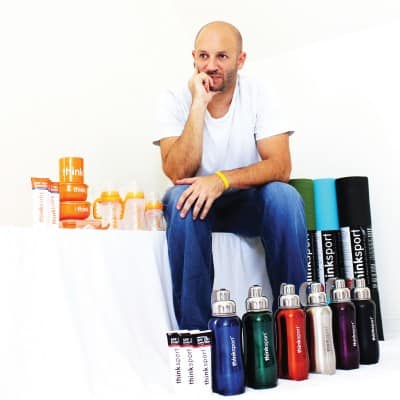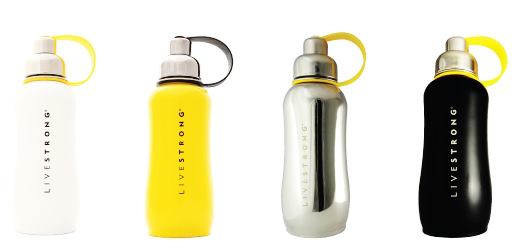Inspiyr spoke with Kevin Brodwick of thinksport, a company whose purpose is to create safe, alternate products for everyone from babies to athletes. Kevin shared his story of building thinksport, and his views on how consumers can protect themselves from cancers and other chemical-causing diseases when purchasing everyday products.
“The reality is that 95% of cancers have been linked to environmental causes. Skin cancer for example is the most dominant cancer, but also the easiest to defend against.”

Tell us the story behind thinksport. How and why did you start it?
While working for a lab funded by the National Institutes of Health, I became aware of just how wide-spread the issue of chemical hazard existed. Specifically, we focused on endocrine disruptors leaching from consumer products. What we found was that it didn’t matter where the products were being made, every country was producing products with questionable ingredients. We approached many of the big corporations to lead them to alternatives, and when they pushed back, I decided it was time to launch a company that was solely focused on creating safe products for everyone from babies to athletes.
We launched thinkbaby 6 years ago and quickly followed it with the launch of thinksport. As a company we first focus on using safe ingredients and materials. We use the Precautionary Principle in everything we build. Materials have to be well vetted before they are used in any of our products. We don’t jump on some material just because it is free of a chemical that is known in the media. But simply having a safe product is not enough. So our next steps are focused on building in as much functionality and sustainability as possible. And it doesn’t make sense to then price the products out of reach of all consumers. As an example, most insulated sports bottles are upwards of $30 to $40. We sell ours for only $20.
thinkbaby and thinksport continue to bring about safe alternatives to products in the market that we know are fraught with problems. Our goal is for someone to walk up to our product and say, “that’s thinksport, they stay up late worrying about chemicals, so that I can focus on the other million things going on in my world.”
What’s the problem with most containers and sunscreens on the market today?
When we entered the market, a majority of the sports bottles were made from polycarbonate (a clear plastic) which contains Bisphenol-A (BPA). We were actively part of supplying the world information on why this chemical should be avoided. Even today, other bottle companies have launched with “BPA free” statements, but have landed on equally questionable materials. The government of Canada conducted their own study of “BPA free” bottles. Every one of them detected for BPA, except for one – ours. The ironic thing was that the only one that bragged about being made in the USA, tested the highest for BPA
As far as sunscreen goes, we’ve never entered a marketplace that was so full of marketing BS as sun care. The statements on sunscreen are pretty much ridiculous. Luckily, there is a fantastic database out there called Skin Deep. It is put together by the folks at the Environmental Working Group. You can simply plug your sunscreen, or its ingredients into the database to see the safety score.
There is now a tremendous amount of media attention on chemical sunscreens, as the ingredients have been linked to being carcinogenic, reproductive toxins and endocrine disruptors.
The other problem with sunscreen is that there is also a lot of false information out there as to how sunscreens works. Recent science studies have shown that people apply 25% of the correct amount of sunscreen. The problem is that the SPF is a logarithmic function. So even if you put SPF 100 on, you’re actually getting about SPF 3. Second, SPF is a measure of UVB, which is what causes burns. You need a truly broad-spectrum formulation that covers UVA and UVB. Physical block sunscreens with high percentages of zinc oxide or titanium dioxide tend to be better at this.
In general, if you don’t know the ingredient or can’t pronounce it, odds are you don’t want to apply it. By the way, the difference between SPF 30 and SPF 100 is only about 3% more effective. And it is probably leading people to spend more time in the sun than they should.
Doesn’t the FDA regulate this stuff? If not, how can consumers protect themselves?
The FDA seems to be under constant pressure from big corporations. They hadn’t made any changes to sunscreen rules for over 30 years. A lot has changed in the last 30 years, including the creation of thousands of new chemicals. The US lags tremendously on the chemical safety front. It seems to take a disaster like DDT to get something banned.
The good news though is that the media is doing a better and better job reporting on chemicals in consumer products. And there is a flood of companies starting to try and capitalize on the market. For better or worse, when these small companies begin chipping away on revenues of larger players, it forces the majors to change. This is exactly what has happened in the baby bottle space and sports bottle space.
Tell us about your partnership with LIVESTRONG. How did that come about, and how does it work?
We looked for a non-profit that was equally aggressive in doing the right thing as we are. I’ve been around LIVESTRONG since its inception. I’ve been a triathlete and bike racer for the last 20 years. I’ve seen firsthand how much support the organization has generated for people newly diagnosed. Their ability to effectively navigate someone through the arguably scariest time of their life is more than worthwhile, it is necessary. They don’t help people 20 years from now, they help people today.
The reality is that 95% of cancers have been linked to environmental causes. Skin cancer for example is the most dominant cancer, but also the easiest to defend against. LIVESTRONG has also fully embraced pushing folks to living active and healthy lifestyles as part of their focus. A portion of the sales of thinksport LIVESTRONG bottles and all of our sunscreens goes back to LIVESTRONG’s fight against cancer. If you or someone you know has cancer, please point them to www.LIVESTRONG.org
There seems to be increased interest in socially-good businesses and eco-friendly products. Why is that?
Everyone wants to grow up to be Patagonia…Okay that’s a joke, but seriously they wrote the book on it. We just borrowed a page. I can’t imagine running a company that didn’t provide some sort of give back to society or the environment. It’s really great that so many companies are equally compelled. It is a subject that I speak regularly on with budding entrepreneurs and MBA programs.
Lots of our audience may be considering starting a socially good business, or just have a dream they haven’t pursued yet. What advice do you have for them?
“If you got a hunch, bet a bunch. If you hunch is wrong, your bunch is gone.” I have no idea where I heard this, but it’s true. You can’t go into an enterprise not believing in what you’re doing. I’m not advocating quitting your job and jumping head first. There are certainly ways to begin building something after work hours. Know though that the process is going to take longer and be more expensive than you imagined. And while creating thinkbaby and thinksport have been one of the greatest accomplishments of my life, I work around the clock. But over the last six years, there literally hasn’t been a day that I’m not excited to get working. I’m super passionate about making the world a less toxic place. You should be just as passionate about whatever you are undertaking to navigate the highs and the lows.
What’s next for you and thinksport?
For me…I hope it’s a nap (not the dirt kind). For thinksport, we have some new additions to the sun care line up and some additional tops in the works for the sports bottles. We are also launching a sister company called thinkvirtual. We will be putting on the first virtual trade show for the sporting good and outdoor world called NATOUT. You’ll be able to interact with product vendors directly in virtual booths and participate in our virtual auditorium where we will have industry experts and thought leaders. It’s the next generation way to engage with product companies without having to travel or create any environmental waste.
Thanks Kevin. We’re looking forward to seeing the other great products you come out with next…


3 comments
My friends and I are looking into your company. It would be nice to see you on Good Guide.
I liked your write-up and appreciate what you are doing to help make consumer products as safe as possible, but your banner has an unfortunate grammatical error which sends the wrong message. Your header says, “…other Chemical-Causing Diseases,” when it should read “…other Chemically-Caused Diseases” to make sense since diseases don’t cause chemicals. Just wanted you to know.
P.W – you’re right…fixed! Thanks for alerting us.
-Inspiyr
Comments are closed.